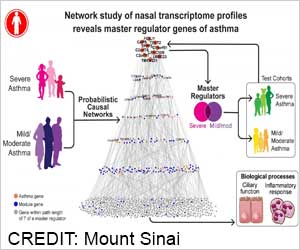Nasal signatures and master regulator genes of different classes of asthma have been identified by a group of researchers. Potential to develop novel therapies.

‘Nasal signatures of mild, moderate, and severe asthma have been identified. Master regulator genes that causally regulate key biological processes such as inflammatory response and ciliary function that underlie asthma have also been identified. Potential to develop novel therapeutics for asthma.’
Read More..




Researchers identified :
Read More..
- Master regulator gene common to asthma across severity and ages (FOXJ1)
- Master regulator genes of severe persistent asthma in children (LRRC23, TMEM231, CAPS, PTPRC FYB)
- Master regulator genes of mild/moderate persistent asthma in children and adults (C1orf38, FMNL1).
Method
156 children were recruited at Mount Sinai Health System in New York with severe persistent asthma as well as controls for nasal transcriptome profiling.
Network-based and probabilistic causal methods were applied to identify severe asthma genes and their master regulators.
The same approach was then taken in an independent cohort of 190 adults with mild/moderate asthma and controls to identify mild/moderate asthma genes and their master regulators.
Advertisement
Said Mount Sinai’s Dr. Supinda Bunyavanich of the research: "Asthma is a common disease that affects people of all ages around the world. We studied nasal samples from children and adults with varying asthma severity not only to identify nasal signatures of mild, moderate, and severe asthma, but also to decipher master regulator genes that causally regulate key biological processes such as inflammatory response and ciliary function that underlie asthma. The master regulators we identified provide a novel path forward for uncovering mechanisms and novel therapy for asthma."
Advertisement
Source-Eurekalert















